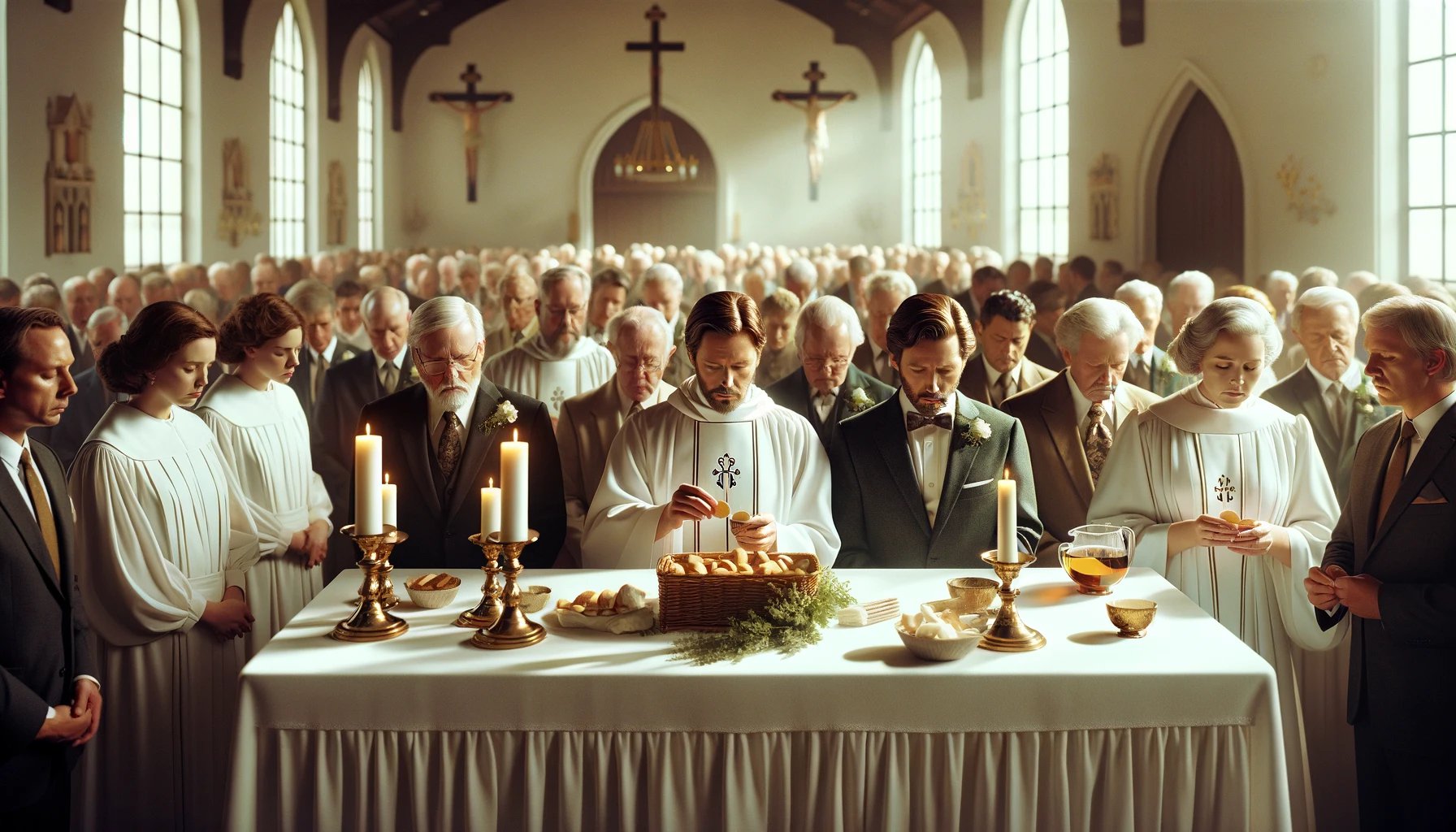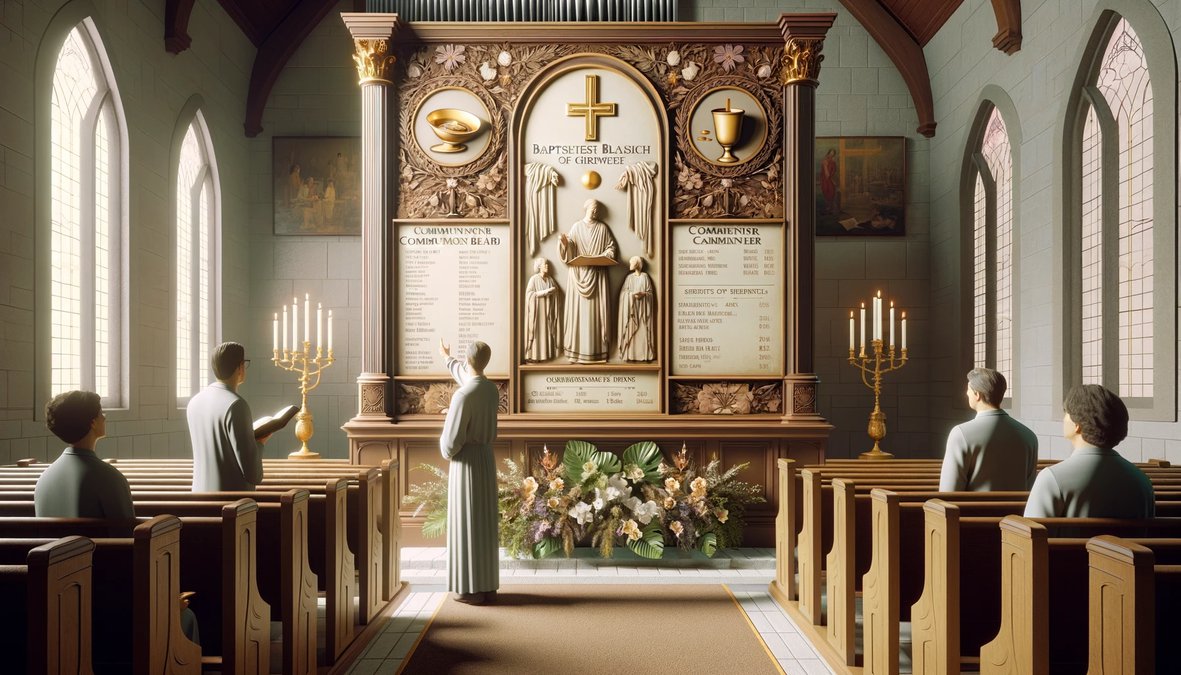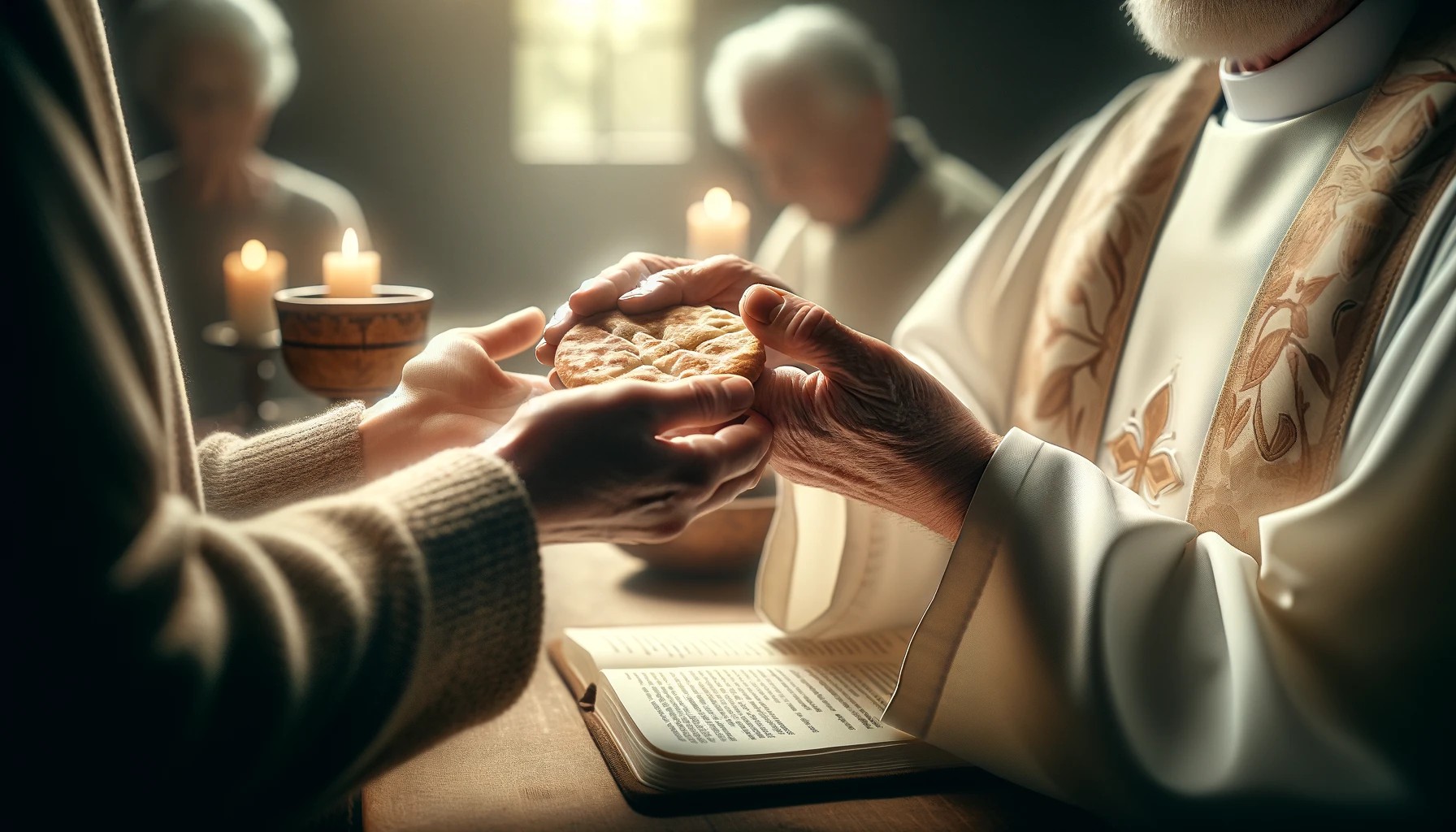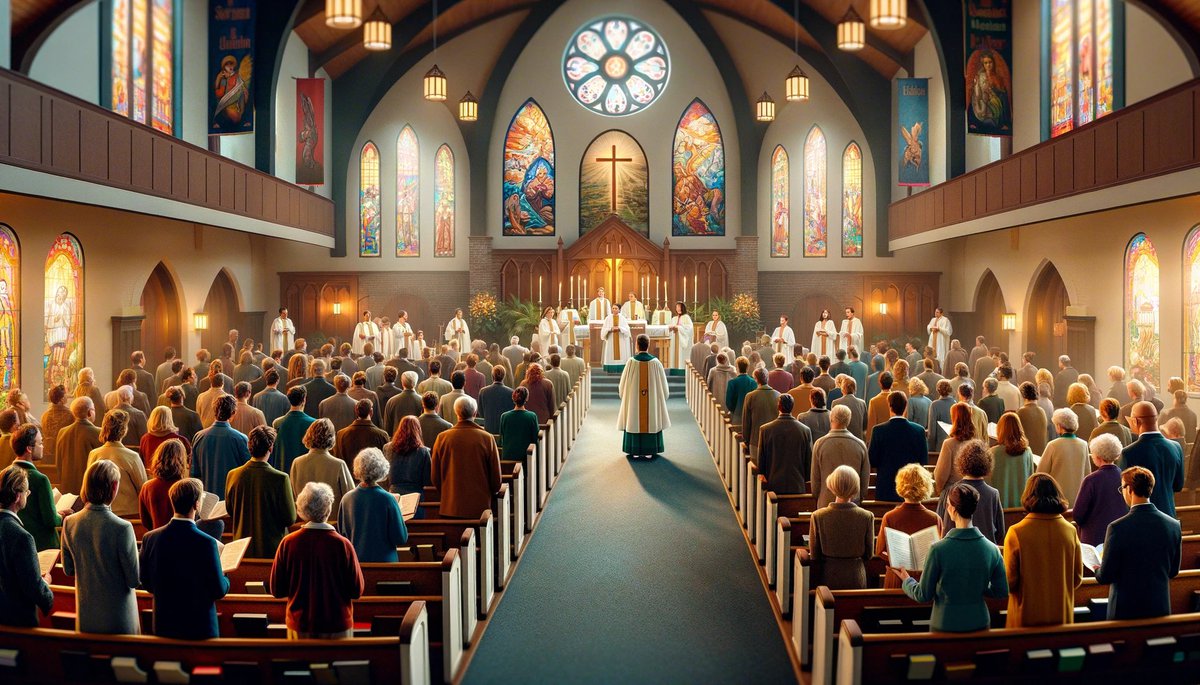Home>Theology and Spirituality>Why Do Pentecostals Take Communion


Theology and Spirituality
Why Do Pentecostals Take Communion
Published: February 24, 2024
Jason DeRose, Managing Editor at Christian.net, uses his expertise in religion and journalism to deepen understanding of faith's societal impacts. His editorial leadership, coupled with a strong academic background, enriches the platform’s diverse content, earning him recognition in both journalism and religious circles.
Discover the significance of communion in Pentecostal theology and spirituality. Explore the reasons behind Pentecostals' observance of this sacred ritual.
(Many of the links in this article redirect to a specific reviewed product. Your purchase of these products through affiliate links helps to generate commission for Christian.net, at no extra cost. Learn more)
Table of Contents
Introduction
Communion, also known as the Lord's Supper or the Eucharist, holds profound significance in the spiritual lives of Pentecostal believers. This sacred practice serves as a poignant reminder of the sacrificial love of Jesus Christ and the unity of the body of believers. The act of taking communion is deeply rooted in the teachings of Jesus and is a central aspect of Pentecostal worship and spiritual nourishment.
In this article, we will delve into the rich theological and spiritual significance of communion within Pentecostalism. We will explore the biblical foundation for this practice, its symbolic and spiritual meaning, and the manner in which it is observed within Pentecostal churches. By gaining a deeper understanding of why Pentecostals take communion, we can appreciate the profound impact it has on their faith and spiritual journey.
Read more: Why Do Catholics Take Communion
The Significance of Communion in Pentecostalism
Communion holds a central place in the spiritual life of Pentecostal believers, serving as a powerful symbol of their faith and a means of experiencing the presence of Christ in a tangible way. The act of partaking in communion is deeply significant, representing the core tenets of Pentecostal theology and spirituality.
At the heart of Pentecostalism is a fervent emphasis on the experiential aspect of faith. Communion, as a sacrament, embodies this experiential dimension, allowing believers to tangibly encounter the spiritual reality of Christ's sacrificial death and resurrection. Through the partaking of the bread and the cup, Pentecostals enter into a profound spiritual communion with Christ, experiencing His presence and the transformative power of His atoning sacrifice.
Furthermore, communion serves as a powerful expression of unity within the body of believers. Pentecostals view the act of partaking in communion as a communal experience that unites them not only with Christ but also with one another. It symbolizes the shared identity and fellowship of believers as members of the mystical body of Christ, transcending individuality and emphasizing the interconnectedness of the faith community.
In Pentecostal theology, communion is also seen as a means of spiritual nourishment and empowerment. The act of partaking in the elements is believed to impart spiritual strength, renewal, and healing to the participants. It is a sacred moment of encountering the living Christ, where believers are refreshed and revitalized in their faith journey, drawing from the spiritual sustenance symbolized by the bread and the cup.
Moreover, communion serves as a powerful reminder of the redemptive work of Christ and the hope it brings to humanity. Pentecostals view the act of partaking in communion as a proclamation of Christ's death, resurrection, and imminent return. It is a solemn yet joyous occasion that renews their faith in the promise of salvation and the ultimate victory of Christ over sin and death.
In essence, the significance of communion in Pentecostalism lies in its embodiment of the core values of experiential faith, communal unity, spiritual nourishment, and the proclamation of Christ's redemptive work. It stands as a sacred practice that deeply impacts the spiritual lives of Pentecostal believers, drawing them into a profound encounter with the living Christ and strengthening their bond with the faith community.
The Biblical Basis for Taking Communion in Pentecostalism
The practice of taking communion in Pentecostalism is deeply rooted in the biblical narrative, drawing from the teachings and actions of Jesus Christ as recorded in the New Testament. The foundational basis for communion within Pentecostal theology can be traced back to the Last Supper, a pivotal event in the life of Jesus and His disciples.
In the Gospel accounts of Matthew, Mark, and Luke, the Last Supper is described as the final meal that Jesus shared with His disciples before His crucifixion. During this significant gathering, Jesus took bread, blessed it, broke it, and gave it to His disciples, declaring, "Take, eat; this is my body" (Matthew 26:26, ESV). He then took the cup, gave thanks, and offered it to His disciples, saying, "Drink of it, all of you, for this is my blood of the covenant, which is poured out for many for the forgiveness of sins" (Matthew 26:27-28, ESV).
Pentecostals view this event as the institution of the sacrament of communion by Jesus Himself. The words spoken by Jesus during the Last Supper are regarded as the foundation for the practice of partaking in the bread and the cup as a means of commemorating His sacrificial death and the establishment of the new covenant in His blood. This biblical account serves as the primary scriptural basis for the observance of communion within Pentecostalism, emphasizing the significance of Christ's body and blood as central elements of the spiritual nourishment and redemption offered to believers.
Furthermore, the apostle Paul, in his first letter to the Corinthians, provides additional biblical insight into the practice of communion. In 1 Corinthians 11:23-26, Paul recounts the events of the Last Supper and instructs the Corinthian believers regarding the manner in which they should partake in the Lord's Supper. He emphasizes the solemn and reverent nature of communion, highlighting its significance as a proclamation of the Lord's death until He comes.
Pentecostals draw from Paul's teachings to underscore the spiritual and symbolic importance of communion as a sacred remembrance and proclamation of Christ's redemptive work. The biblical exhortation to examine oneself before partaking in communion, as articulated by Paul in 1 Corinthians 11:27-29, further underscores the solemn and introspective nature of this sacrament within Pentecostal theology.
In essence, the biblical basis for taking communion in Pentecostalism is firmly grounded in the teachings and actions of Jesus Christ as recorded in the Gospels, as well as the apostolic instructions provided by Paul in the New Testament. These biblical foundations serve to underpin the spiritual significance and theological understanding of communion within the Pentecostal tradition, shaping the manner in which believers approach and partake in this sacred practice.
The Spiritual and Symbolic Meaning of Communion for Pentecostals
The act of partaking in communion holds profound spiritual and symbolic significance for Pentecostal believers, encompassing a rich tapestry of theological meaning and spiritual depth. At the core of Pentecostal theology is a vibrant emphasis on the experiential dimension of faith, and communion serves as a poignant embodiment of this experiential encounter with the living Christ.
For Pentecostals, communion represents a sacred moment of encountering the presence of Christ in a tangible and transformative manner. As they partake in the bread and the cup, they enter into a spiritual communion with the living Christ, experiencing His redemptive love and the transformative power of His atoning sacrifice. This experiential aspect of communion is central to Pentecostal spirituality, as believers seek to tangibly encounter the living Christ and be renewed in their faith journey.
Moreover, communion holds profound symbolic significance for Pentecostals, representing the core tenets of their faith and the redemptive work of Christ. The bread symbolizes the body of Christ, broken for the salvation and healing of humanity, while the cup represents His shed blood, signifying the new covenant and the forgiveness of sins. Through the partaking of these elements, Pentecostals symbolically proclaim their faith in the sacrificial death and resurrection of Christ, embracing the transformative power of His redemptive work.
Furthermore, communion serves as a powerful expression of unity within the body of believers. Pentecostals view the act of partaking in communion as a communal experience that unites them not only with Christ but also with one another. It symbolizes the shared identity and fellowship of believers as members of the mystical body of Christ, transcending individuality and emphasizing the interconnectedness of the faith community.
In essence, the spiritual and symbolic meaning of communion for Pentecostals encompasses a profound encounter with the living Christ, a symbolic proclamation of His redemptive work, and a communal expression of unity within the body of believers. This sacred practice stands as a poignant reminder of the sacrificial love of Jesus Christ and the transformative power of His atoning sacrifice, shaping the spiritual lives and faith journey of Pentecostal believers.
The Practice of Communion in Pentecostal Churches
The practice of communion in Pentecostal churches is a deeply reverent and spiritually significant aspect of their worship services. Pentecostal congregations approach the observance of communion with solemnity, reverence, and a profound sense of spiritual anticipation. The manner in which communion is conducted reflects the theological emphasis and spiritual ethos of Pentecostalism, creating a sacred space for believers to encounter the living Christ and partake in the spiritual nourishment symbolized by the bread and the cup.
In Pentecostal churches, the observance of communion is often integrated into the broader context of the worship service, typically occurring at regular intervals, such as monthly, quarterly, or on special occasions of spiritual significance. Prior to the communion service, there is a deliberate and prayerful preparation, emphasizing the sanctity of the sacrament and the spiritual readiness of the participants. This preparatory phase may include moments of introspection, repentance, and prayer, as believers prepare their hearts to partake in communion and encounter the presence of Christ in a meaningful way.
The communion elements, consisting of unleavened bread and non-alcoholic grape juice, are typically placed on a communion table or tray, symbolizing the body and blood of Christ. The act of partaking in communion is often accompanied by hymns, worship songs, and scriptural readings that center on the redemptive work of Christ, creating a contemplative atmosphere that underscores the significance of the sacrament. The congregation is invited to approach the communion table reverently, with a focus on personal reflection, gratitude for Christ's sacrifice, and a deep sense of spiritual communion with the body of believers.
During the communion service, a designated minister or pastor leads the congregation in the solemn observance of the sacrament. The minister may offer prayers of consecration, expressing gratitude for Christ's sacrifice, invoking the presence of the Holy Spirit, and inviting believers to partake in the bread and the cup. The act of partaking in communion is often conducted with a sense of spiritual intimacy and unity, as believers collectively partake in the elements, symbolizing their shared faith in Christ's redemptive work and their unity as members of the body of Christ.
Following the partaking of communion, there is often a time of prayer, reflection, and thanksgiving, allowing believers to internalize the spiritual significance of the sacrament and its impact on their faith journey. The communion service may conclude with a benediction or a hymn that reaffirms the redemptive hope and spiritual unity experienced through the act of communion.
In essence, the practice of communion in Pentecostal churches is characterized by a deliberate emphasis on spiritual preparation, reverence, and communal participation, creating a sacred space for believers to encounter the living Christ, proclaim their faith in His redemptive work, and experience the transformative power of His presence in their midst.
Read more: Why Do You Take Communion
Conclusion
In conclusion, the practice of taking communion holds profound significance within Pentecostalism, shaping the spiritual lives and faith journey of believers in profound ways. From its rich theological and biblical foundations to its experiential, symbolic, and communal dimensions, communion stands as a poignant embodiment of the core values and beliefs of Pentecostal theology and spirituality.
The significance of communion in Pentecostalism extends beyond a mere ritualistic observance; it encapsulates a sacred encounter with the living Christ, a symbolic proclamation of His redemptive work, and a communal expression of unity within the body of believers. The act of partaking in communion serves as a powerful reminder of the sacrificial love of Jesus Christ, the transformative power of His atoning sacrifice, and the hope it brings to humanity.
Furthermore, the biblical basis for communion, as evidenced in the Last Supper and the apostolic teachings, underscores its foundational importance within Pentecostal theology. The scriptural narratives provide a compelling framework for understanding the spiritual significance and theological depth of communion as a sacred remembrance and proclamation of Christ's redemptive work.
The spiritual and symbolic meaning of communion for Pentecostals encompasses a profound encounter with the living Christ, a symbolic proclamation of His redemptive work, and a communal expression of unity within the body of believers. This sacred practice stands as a poignant reminder of the sacrificial love of Jesus Christ and the transformative power of His atoning sacrifice, shaping the spiritual lives and faith journey of Pentecostal believers.
In Pentecostal churches, the observance of communion is characterized by solemnity, reverence, and a profound sense of spiritual anticipation. The deliberate and prayerful preparation, the contemplative atmosphere, and the communal participation underscore the spiritual ethos and theological emphasis of Pentecostalism, creating a sacred space for believers to encounter the living Christ and experience the transformative power of His presence.
In essence, the practice of taking communion in Pentecostalism serves as a powerful expression of faith, unity, and spiritual nourishment, drawing believers into a profound encounter with the living Christ and strengthening their bond with the faith community. It stands as a timeless and sacred tradition that continues to shape the spiritual identity and collective journey of Pentecostal believers around the world.














